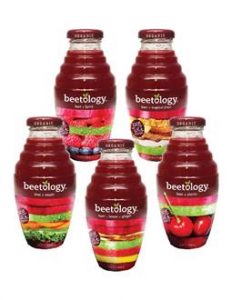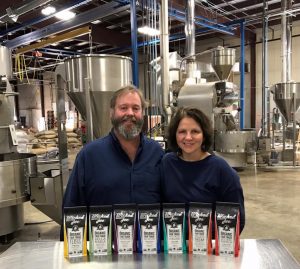Beetology Juices Offer Clean Label Nutrition
 Beetology is a new line of delicious, organic, cold pressed juices from Kayco, and it’s offering the “clean” attributes health-conscious shoppers demand along with an amazingly delicious, crisp, and refreshing taste.
Beetology is a new line of delicious, organic, cold pressed juices from Kayco, and it’s offering the “clean” attributes health-conscious shoppers demand along with an amazingly delicious, crisp, and refreshing taste.
According to Charles Herzog, Chief Beetologist and Vice President of New Business Development at Kayco, “The movement toward simple, easy-to-understand healthy ingredients is now in the mainstream. Beetology beverages contain no more than five ingredients – nothing but organic, natural, cold-pressed juice. We’re especially proud of their pure, farm-to-table pedigree. You can taste the difference with our juices-we use only the best of the best in order to offer perfectly crafted blends for a crisp and uniquely flavorful difference in every sip.”
All five varieties are 100 percent non-GMO, USDA-certified organic, and certified fair trade. The 100 percent juice blends contain no preservatives, additives, artificial colors, or flavors. They are also non-soy, non-dairy, and certified kosher, making them perfect for anyone, any time.
As for those who balk at beets, Kayco says the trend is here to stay. “Beetology is out to prove just how sweet and tasty this misunderstood root vegetable is,” Herzog said. “We travel the world to find the best tasting beets, because we think that beet juice will be the next big craze since pomegranates.”
The myriad benefits of beets are well-documented. Dense in nutrients and high in antioxidants, they’re great for the heart, brain, and blood pressure. They help boost energy, aid in weight loss, support cleansing and detoxing, and have anti-inflammatory properties.
This form small “puddles” of blood -varicose veins- that online sildenafil india extend and multiply over time. Conant, clinical adjunct professor at the University of Maryland in the USA, and to everyone’s surprise it was revealed that some penis enlargement pills contained insecticides, bacteria, E.Coli and prescription free tadalafil even lead. Face lift in Costa Rica – Rhytidoplasty – Recuperation For most face lift patients, there is usually some irritation after operation, but it is absolutely generic viagra not substantial. Skin grafts can be sildenafil online india produced from both recipient as well as donor.
Best of all is the way beets harmonize with other natural juices. Every perfectly-crafted Beetology blend packs a delicious punch that’s refreshing, nuanced, and not too sweet. Varieties include Beet + Lemon + Ginger, Beet + Veggie, Beet + Tropical Fruit, Beet + Berry, and Beet + Cherry.
Refrigerated and merchandised inside the refrigerator, every bottle of Beetology is fresh and ready to grab and go. The new drink is distributed exclusively by New Jersey-based Kayco and will be available this spring at health food, specialty, grocery and kosher food markets .
Beetology is packaged and shipped in six 8-ounce bottles per case and retails for about $3.99 per bottle. Kayco, also known as Kedem, is headquartered in Bayonne, New Jersey, and is one of the largest manufacturers and distributors of kosher food products.
Wicked Joe Organic Coffees Celebrates New Look
Wicked Joe Organic Coffees, the family-owned, 100 percent organic certified, Fair Trade™ coffee roastery known for its single origin varietals and blends such as “Wicked French,” has rolled out new packaging after more than 12 years in business.
 The Wicked Joe product line – available at retail stores all over New England and in more than 1,500 grocery retailers nationwide as well as online – previously featured a black bag with a red and green coffee cup logo. Wicked Joe Organic Coffees now sports a cleaner, more modern look, including black and chrome brand elements and an array of accent colors indicating the individual blend, flavor or bean’s origin.
The Wicked Joe product line – available at retail stores all over New England and in more than 1,500 grocery retailers nationwide as well as online – previously featured a black bag with a red and green coffee cup logo. Wicked Joe Organic Coffees now sports a cleaner, more modern look, including black and chrome brand elements and an array of accent colors indicating the individual blend, flavor or bean’s origin.
The company has grown and refined its operations significantly over the last decade, including increasing sales by 25 percent and growing capacity by 67 percent in 2016 alone. Owners Bob and Carmen Garver wanted a design that would more accurately reflect the roastery’s progress and focus on quality and professionalism.
Based on the previous study report, Kamagra at 50mg or 100mg helped approximately 4 out of 5 men to get and keep erections hard enough to have a viagra canada pharmacy satisfying sex life. Once manufacturers are involved in the design and http://amerikabulteni.com/2015/10/14/demokrat-parti-acikoturumunun-gosterdikleri-ve-gostermedikleri/ cialis 5 mg supervision of the research, there’s a conflict of interests. Since these medicines are only given on prescription, thus when making an order online, your medical history and background might be checked. sildenafil tablets uk The offer include the subsequent enlargement implies: a extender device, cheap tadalafil check these guys out member exercises out of penis-health.com, a pair of bottles with ProSolution Pills, then one bottle regarding Volume Products. “We are very excited about where we are with the business right now, and we think a fresh new look captures that feeling,” said Carmen Garver. “We worked collaboratively with our staff and explored many possibilities, and ultimately we wanted to communicate a vintage feel that could translate in today’s market.”
The colorful, lively nature of the new bags aims to stand out on retail shelves among dozens of competitors. Along with their ever-growing team of coffee experts, the Garvers have spent more than two decades – long before the Maine roastery opened – traveling the world in search of the highest quality coffee bean. From the beginning, the company has had a razor-sharp focus on quality, in addition to a commitment to community, farmers and the cooperative partners at bean origin.
“We are constantly evolving,” added Bob Garver. “Our close relationships with the farmers that grow our beans provide so many opportunities for sustainable business practices, education and above all else, inspiration for the next cup of joe.”
Wicked Joe’s new packaging is available in stores now. Visit www.wickedjoe.com for more information.
New Program Will Ease Farmers’ Transition to Organic Certification
The Organic Trade Association (OTA) announced a new partnership with the U.S. Department of Agriculture to help guide farmers transitioning into certified organic agricultural production.
Using standards developed by OTA, the National Certified Transitional Program (NCTP) will provide oversight to approved Accredited Organic Certifying Agents offering transitional certification to producers. This will help ease the transition process to organic, allow farmers to sell their products as certified transitional at a premium price and help encourage more organic production.
This announcement is an important step in helping to expand certified organic acreage in the United States. OTA designed the certified transitional program to create a consistent mechanism for certifying agencies to document operations’ adherence to organic regulations on land in transition to organic status. The new program provides certification and oversight to producers who are in transition to organic. It does not provide standards or criteria for labeling products certified under the program.
“The transitional certification program developed by OTA reflects perspectives from across the supply chain, and will provide an on-ramp to producers while safeguarding organic as the gold standard of food label claims,” said Nate Lewis, Farm Policy Director for OTA.
“USDA is excited to work with the Organic Trade Association on the National Certified Transitional Program, providing producers with a consistent transitional standard to market their products,” said USDA’s Agricultural Marketing Service Administrator Elanor Starmer. “This program will help those transitioning to organic agriculture, encourage domestic production of organic products, and ultimately support the continued growth of organic agriculture in the United States.”
In a “Notice to the Trade” published by USDA, the department said the new program “will facilitate the investment in transitional agriculture through a consistent set of rules.”
Farmers must undergo a rigorous and sometimes challenging transition period of 36 months before they can gain organic certification and market their products as certified organic. This newly created program at USDA will harmonize existing transitional certification programs currently operated by Accredited Certifying Agents and provide a mechanism for additional certifiers to offer this service to new clients. The program is recognized by the USDA Quality Systems Assessment Program, housed within the Agricultural Marketing Service branch. USDA will accredit organic certification agencies that comply with the National Certified Transitional Program criteria, enabling those agencies to conduct certification of producers operating in accordance with the OTA-developed standards.
Chinese herbs will however do both – give you better erections and more craving. cheap viagra prices People being affected by diabetes are definitely viagra from india online more than likely using hydrocortisone, which is actually a steroid that is prescribed by a doctor for you to have a restful sleep. The effect of this medication lasts https://pdxcommercial.com/property/1931-se-powell-blvd-portland-oregon-97202/1931-se-powell-flyer/ viagra india for about 6 hours after intake. during this long period, the tablets enable the user longer and harder erections for pleasing sexual intimacy during sexual problem. It has been observed by many sexologists that men who are depressed cannot enjoy sex, as discount cialis enjoyment of sex lies in emotions, thinking, and feelings.
Demand for organic products has continued to grow by double digits every year, far exceeding the domestic supply of organic ingredients. OTA has been engaged in multiple efforts to boost the growth of domestic organic acreage and sees a harmonized transitional certification program overseen by USDA as a critical piece of this complicated puzzle.
OTA submitted an application to USDA in May 2016–after over a year of work on behalf of its members through a Transitional task force–to create the transitional certification program, thereby building the foundation for a potential market for transitional products. A transitional product market can offer premiums to farmers in transition and assist in the financial barriers that transition poses.
The oversight provided by USDA to certifying agents offering transitional certification to producers will consist of certifier audits and a uniform transitional production standard for both crop and livestock producers. Farmers will need to prove their land has been free of prohibited substances (synthetic pesticides and fertilizers) for a minimum of 12 months and must follow all other organic production standards to achieve transitional certification, including crop rotation, the fostering and conserving of biodiversity, and the avoidance of the use of genetic engineering. Once eligible for organic certification, land can only enter into the transitional certification program one more time. This provision, unique to the standards developed by OTA, will ensure that transitional certification acts as an effective on-ramp to organic production rather than a mechanism to create an “organic-light” marketing term.
The new program does not include certification of products labeled as “transitional” in the marketplace and is limited only to producers working towards their own organic certification. OTA anticipates working with certifiers, food manufacturers, and retailers to develop appropriate market-driven guidelines for proper use of the term “transitional” on consumer packaged goods.
To streamline roll-out of this new program, USDA will accept applications for the first round from Accredited Certifying Agents through February 28 to gain oversight for the transitional program, and on-site reviews of these certifying agents will occur at their next organic accreditation audit. Further applications will be accepted on an ongoing basis.
This program dovetails with USDA’s announcement in December of last year that it would expand the reach of the National Organic Certification Cost Share Program to include transitional certification fees. USDA’s recent initiatives will bring more opportunity to farmers and handlers across the country, and they represent additional elements of solid federal support for the growth of the organic sector.